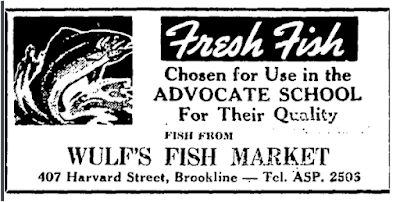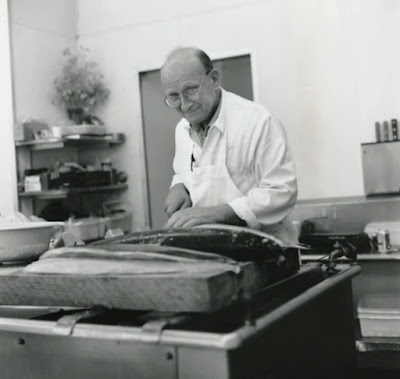 |
| May 13, 2016 |
May 11, 1719 - New road planned connecting north and south
May 12, 1788 - Dr. Aspinwall's smallpox hospital
May 8, 1874 - Brookline loses its Charles River riverfront
May 13, 2016 - Wulf’s Fish Market closes after 90 years
May 11, 1719
New road planned connecting north and south
Two years after Brookline's first church was built on the Sherborn Road (now Walnut Street) it was agreed to lay out a new road to provide better access to the church for residents in the north part of town.
 |
| Sections of two maps of showing Brookline in 1693 and 1746 prepared for the Brookline Historical Society in 1923 (Click image for larger view) |
The road (red arrow) was to be called the New Lane. It would run from today's Washington Street (then called the Watertown Road) to the Sherborn Road near the church (circled in red.) The sparseness of the town at the time is evident in how the end point of the new road was described in town records: "near to the Lower end of the new stone wall by an old white oak tree."
The New Lane is now Cypress Street. By 1746, it had been extended from the Watertown Road to Harvard Street. (That section is now School Street.)
May 12, 1788
Dr. Aspinwall's smallpox hospital
Town Meeting voted to allow Dr. William Aspinwall to build a hospital on his farm where smallpox inoculation could be administered to help fight the spread of the disease.
Dr. Aspinwall's smallpox hospital
Town Meeting voted to allow Dr. William Aspinwall to build a hospital on his farm where smallpox inoculation could be administered to help fight the spread of the disease.
 |
| Dr. William Aspinwall in a painting by Gilbert Stuart from about 1815, near the end of the doctor's life. |
Aspinwall had reportedly developed an interest in inoculation during his service with the army during the Revolutionary War. Soldiers in the Continental Army has been inoculated at a hospital at Sewall's Point on the Charles River, which was then part of Brookline. In 1778 Aspinwall asked the town for permission to build his own facility, but was turned down.
The success of his post-war hospital led the doctor to build two more such facilities in town. He later turned to the better method of vaccination. Aspinwall died in 1823 at the age of 79.
May 8, 1874
Brookline loses its Charles River riverfront
A narrow strip of Brookline land between the Charles River and today's Commonwealth Avenue became part of the City of Boston, connecting the recently annexed town of Brighton to the rest of the city. Brighton had voted in favor of annexation seven months earlier, on the same day that Brookline voters overwhelmingly rejected annexation.
Brookline loses its Charles River riverfront
A narrow strip of Brookline land between the Charles River and today's Commonwealth Avenue became part of the City of Boston, connecting the recently annexed town of Brighton to the rest of the city. Brighton had voted in favor of annexation seven months earlier, on the same day that Brookline voters overwhelmingly rejected annexation.
There was extensive discussion in the state legislature over how much Brookline land should be given to Boston. The most extensive proposal would have given about one-third of Brookline -- the area above the red line outlined on top of an 1874 map below -- to Boston. It would have included all of Brookline north of Beacon Street and a considerable portion extending southwest to encompass the Boylston Street Reservoir (part of Boston's water supply system).
 |
| The parts of Brookline above the red line -- sparsely populated and lightly developed at the time -- would have been given to Boston in a plan put forth by one group in 1874. |
One proponent of the larger land-taking argued that the thin strip eventually given would be "like the cord that holds a stationary balloon to the earth." Opponents of the broader plan, painting it as a backdoor attempt at annexation, prevailed.
May 13, 2016
Wulf’s Fish Market closes after 90 years
Wulf’s Fish Market closes after 90 years
Wulf's Fish Market, one of the longest-running retail businesses in Brookline's history, closed its store at 407 Harvard Street. Founded by Sam Wulf in 1926 and later run by his son Alan, Wulf's continues as a wholesale and retail business, operating out of the seaport district in Boston.
 |
| Sam Wulf, cutting fish at his Brookline store. (Photo from Wulf's Fish website) |
Sam Wulf died in 1988 at the age of 85.
No comments:
Post a Comment